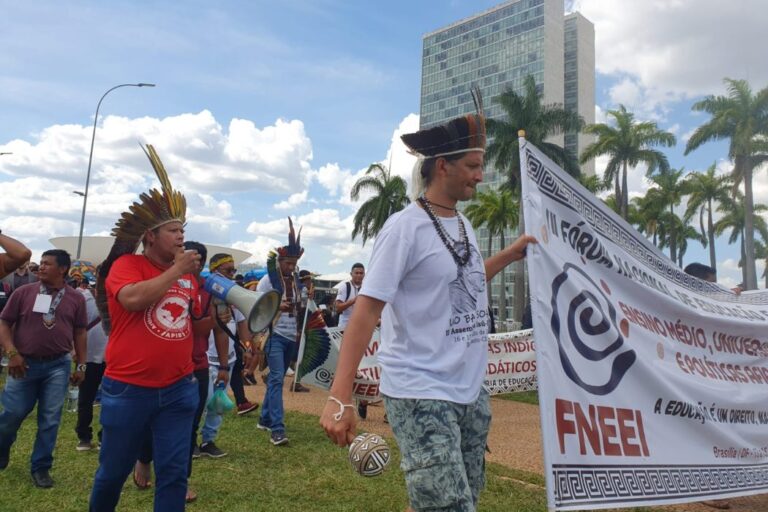- Brazil’s Congress has pushed through a new law that includes several anti-Indigenous measures that strip back land rights and open traditional territories to mining and agribusiness.
- It includes the controversial time frame thesis, requiring Indigenous populations to prove they physically occupied their land on Oct. 5 1988, the day of the promulgation of the Federal Constitution; failure to provide such evidence will nullify demarcated land. The decision provoked outrage among activists, who say the new law is the biggest setback for Indigenous rights in Brazil in decades.
- Both President Lula and the Supreme Court have previously called the measures in the bill unconstitutional and against public interests, and Indigenous organizations announced they will challenge the law.
- Brazil’s Congress has pushed through a new law containing a series of anti-Indigenous and anti-environmental clauses, overruling President Luiz Inácio Lula da Silva’s previous veto of some of the bill’s most harmful passages. Activists have lambasted the decision, saying it drastically strips back Indigenous rights and poses a threat to the future of the Amazon Rainforest and other Brazilian biomes.
On Oct. 20, Lula partially vetoed some of the most contentious clauses in the bill known as PL 2903, which were considered a major setback to Indigenous rights. Among them was the controversial “time frame” proposition (known as marco temporal in Portuguese), which would bar Indigenous people from claiming the rights to land that they did not physically occupy on Oct. 5, 1988, the date Brazil’s current Constitution was promulgated.
Just a month earlier, the Supreme Court had also ruled the marco temporal was unconstitutional, in a 9-2 decision.
But on Dec. 14, Congress, dominated by the powerful ruralist caucus representing agribusiness and mining interests, overwhelmingly voted to reject Lula’s veto, bringing into law most of the vetoed propositions. An absolute majority ruling is required to reject a presidential veto, which means 257 votes in the lower House and 41 in the Senate. The vote surpassed this requirement, with the lower House voting 321-137 and the Senate voting 53-19.
In addition to the marco temporal, which prevents the demarcation of new Indigenous territories without proof of prior occupation, the new law also contains several other measures that activists have labeled anti-Indigenous. Among them: non-Indigenous occupants of traditional lands, including illegal loggers and ranchers, will be permitted to remain there until the territory is demarcated — a process that can take decades. Congress also overturned a veto that opened a loophole for mining, the installation of military equipment, and road construction without prior consultation of the Indigenous population or Funai, Brazil’s Indigenous affairs agency.
The new law also prohibits already demarcated land from being expanded and enforces the new rules to be applied to territories currently undergoing the demarcation process. Furthermore, any demarcated land that currently doesn’t comply with the new rules will be nullified.
In a statement, the Indigenous rights organization Survival International called these measures “the most serious and vicious attack on Indigenous rights in decades.”


